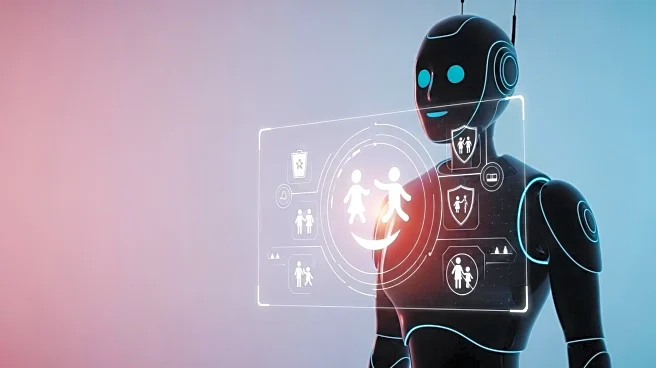What's Happening?
The Federal Trade Commission (FTC) is investigating AI chatbots from companies like Alphabet, Meta, and OpenAI, focusing on their use as companions for children and teens. The inquiry seeks to understand how these companies test, monitor, and measure potential harm to young users. A survey by Common Sense Media revealed that over 70% of teens use AI companions, with more than half using them regularly. Concerns have been raised about chatbots providing harmful advice, such as concealing eating disorders or personalizing suicide notes. The FTC aims to ensure that AI firms are taking adequate steps to protect children, with some companies already implementing safety features like parental controls and disclaimers.
Why It's Important?
This investigation underscores the critical need for safeguarding young users in the rapidly evolving AI landscape. As AI chatbots become more prevalent, their potential to influence vulnerable populations, such as children and teens, poses significant risks. The FTC's actions could lead to enhanced regulatory oversight, compelling companies to prioritize user safety and transparency. This could impact the development and deployment of AI technologies, influencing industry standards and consumer trust. The inquiry also highlights the importance of AI literacy, urging educational institutions to incorporate AI awareness into their curricula to better prepare young users.
What's Next?
The FTC has issued orders for a teleconference with the involved companies by September 25 to discuss their submissions. The investigation may result in new guidelines or regulations for AI chatbot usage, particularly concerning minors. Companies might need to bolster their safety protocols and transparency measures to comply with potential regulatory changes. Stakeholders, including parents and educators, may push for increased AI literacy and awareness initiatives to ensure safe interactions with AI technologies.
Beyond the Headlines
The ethical considerations of AI chatbots are profound, as they challenge traditional notions of human-machine interaction. The potential for AI to influence mental health and behavior necessitates a reevaluation of ethical standards in AI development. This inquiry could catalyze broader discussions on the societal impact of AI, shaping cultural perceptions and legal frameworks around digital companionship and AI's role in human life.









